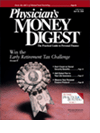Publication
Article
Physician's Money Digest
Know the ABC's of Mutual Fund Investing
Author(s):
Deciding which mutual funds ofthe many thousands are rightfor your portfolio can be adaunting task. Making thewrong choice can have a negative long-termimpact on your fund's performance.Examined below are three types of loadfunds (ie, mutual funds that are sold bysalespeople who receive commissions)–A, B, and C:
• Class A shares. Class A shares indicatethat the sales commission is deducteddirectly from your investment contributionat the time you make your investment.This is often referred to as a front-endload or front-end sales charge andwill typically cost you 5% to 5.75% ofeach contribution you make to the mutualfund. So if you invest $10,000 in aClass A share mutual fund that pays a5% commission, only $9500 of yourmoney is used to buy mutual fund shares,while $500 is paid out as commissions.
• Class B shares. If you buy a mutualfund under a Class B shares arrangement,there are no front-end salescharges, but the total annual expenseratio of the mutual fund is typicallyhigher than Class A shares. The salespersonis still getting their commissionupfront, and if you move your money toanother mutual fund within the first 5 to7 years, the company will impose anearly surrender charge against youraccount balance. The drawback to ClassB shares is that they tend to lock youinto a fund company when you mightotherwise want to move your money.
• Class C shares. With Class Cshares, the mutual fund company imposesan annual asset-based salescharge rather than charging an upfrontsales charge. This annual sales charge isoften 1% or more. Class C shares oftencharge an early redemption fee or contingentdeferred sales charge if youmove your money to another fund companyduring the first year. This shorterperiod of time for which a redemptionpenalty is imposed is the primary advantageof the Class C shares.
Choosing which share type is right foryou depends on how long you intend toleave your money with a particular fundcompany. Generally, if you plan to leaveyour money with the fund company for avery long period of time, the Class Ashares will result in the lowest long-termcosts. Physician-investors who are focusedon asset allocation typically useClass C shares. While they have fewerobvious advantages, Class B shares maybe a better choice for a new physician-investorwith modest sums to invest.
Stewart H. Welch III, founder ofthe Welch Group, has been ratedone of the nation's top financial advisorsby Money and Worth. Hewelcomes questions or commentsfrom readers at 800-709-7100 orwww.welchgroup.com. Reprinted with permissionfrom the Birmingham Post Herald.
